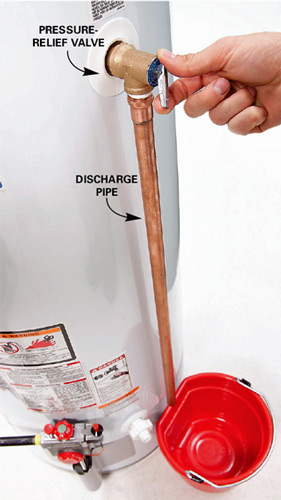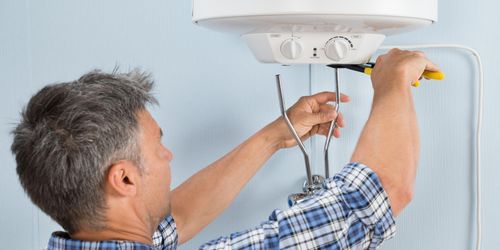Ways to Cope with the Major Hot Water Heater Urgencies
Ways to Cope with the Major Hot Water Heater Urgencies
Blog Article
Just about everyone seems to have their unique rationale on the subject of Warning Signs You Need Water Heater Repairs.

A water heater is one of one of the most crucial fundamental appliances that can be found in a residence. With water heaters, you don't require to undergo the stress of home heating water manually every single time there is a requirement to wash, wash, or the recipes. There is always a possibility that your water heating system would certainly act up as with the majority of mechanical devices.
It is necessary to keep in mind any little malfunction and tackle it rapidly prior to things leave hand. Many times, your water heater starts to malfunction when there is a build-up of debris as a result of constant usage. As a precaution, regular flushing of your water heater is recommended to stop sediment buildup and also avoid useful failure.
Typical hot water heater emergencies and how to manage them
Inadequate warm water
It might be that the water heating unit can't sustain the warm water demand for your home. You might upgrade your water heating system to one with a larger ability.
Changing water temperature level.
Your water heating unit can start producing water of different temperatures usually ice hot or chilly hot. There could be a need to replace either the home heating or the thermostat device of your water heating unit.
Leaking hot water heater storage tank.
A leaky container could be an indicator of deterioration. It could create damage to the floor, wall and also electric tools around it. You can also be at threat of having your apartment flooded. In this situation, you should shut off your hot water heater, permit it to cool, and also meticulously try to find the resource of the issue. At times, all you need to do is to tighten up a few screws or pipeline connections in cases of minor leaks. Yet if this doesn't work and also the leak continues, you could need to utilize the solutions of a specialist for an ideal replacement.
Tarnished or stinky water
You need to understand if the issue is from the storage tank or the water resource when this occurs. If there is no amusing scent when you run cold water, then you are certain that it is your water heater that is damaged. The smelly water can be triggered by corrosion or the buildup of microorganisms or sediments in the water heater tank. You can try flushing out your tank or replacing the anode if the trouble persists once you see this. The function of the anode is to clean bacteria from your storage tank. Because the anode pole replacement requires a detailed expertise of your water heating system, you will need the help of a specialist.
Verdict
Some homeowners neglect little caution and minor faults in their hot water heater device. This only leads to additional damages and also a feasible full break down of your home appliance. You ought to handle your hot water heater mistakes as quickly as they come up to prevent even more costs and unnecessary emergency problems.
With water heating systems, you do not require to go with the tension of home heating water by hand every time there is a requirement to take a bathroom, do the washing, or the recipes. It may be that the water heater can't sustain the hot water need for your apartment. Your water heating system might start producing water of various temperatures generally ice chilly or scalding warm. If there is no funny scent when you run cold water, after that you are specific that it is your water heater that is malfunctioning. The odiferous water can be created by rust or the accumulation of germs or sediments in the water heating system tank.
Water Heater Burst: Why This Happens And What To Do Next
Water Heater Explosion Warning Signs
Since storage water heaters are made of metal and store large volumes of heated water, they carry an increased risk of leaking or even exploding as they begin to rust at the fittings and seams over time. If the thermostat controlling the water temperature within the tank is faulty, or if mineral buildup inside the water heater prevents the thermostat from sensing the water’s temperature correctly, the water could become overheated. This will expand its volume within the tank, causing it to press at the tank’s fittings and seams. If these fittings and seams are rusted or corroded, the pressure could result in a leak or even an explosion.
Here are some risk factors and warning signs of an increased risk of water heater leak or explosion:
Your water heater is more than 10 years old. Your water heater makes clanking, banging or rumbling noises as it heats up, indicating that sediment has built up and hardened inside the tank. There is visible rust on the outside of the water heater, especially located at the pipe fittings or the seams that run down the tank. There is rusty water coming from your water heater, indicating that there may be rust building up inside. Your water heater is leaking, which could indicate either a crack somewhere in the tank or a malfunctioning temperature-and-pressure (T&P) relief valve. What To Do When Water Heater Leaks
If you find water dripping or seeping out of your water heater, or pooling around it, it means your water heater is leaking. If you find a leak, it may be best to call a plumbing professional to diagnose the problem and determine how best to handle it. If you choose to tackle it on your own, there are a few things you can do.
TURN OFF THE POWER
Next, shut off the power to the hot water tank at your home’s electrical breaker box. If you don’t shut off the power, the heating elements within the tank could continue to stay hot, which could pose a fire risk.
If you have a gas-powered water heater, you’ll also need to shut off the gas line leading into the tank.
FIND THE LEAK
Now it’s time to determine where the leak is coming from. Likely locations are the T&P valve, the drain valve or one of the pipes or fittings that feed into the top of the tank. If you see any rust or corrosion on the outside of your water heater’s tank, pipes or fittings, these could also be the source of the leak.
REPAIR THE LEAK
Once you determine the source of your water heater leak, you’ll have a better idea of what steps you need to take to fix the problem. It may be a simple fix—such as using a wrench to tighten fittings or replacing the T&P valve—but it may be something more complicated. You may even need to drain the tank, remove the water heater and install a new one.
https://www.abchomeandcommercial.com/blog/water-heater-burst/

As a serious reader on Common Hot Water Heater Problems, I imagined sharing that piece of content was worth the trouble. Liked our review? Please share it. Help others discover it. Thanks a bunch for your time. Visit us again soon.
Effective fix? Call! Report this page